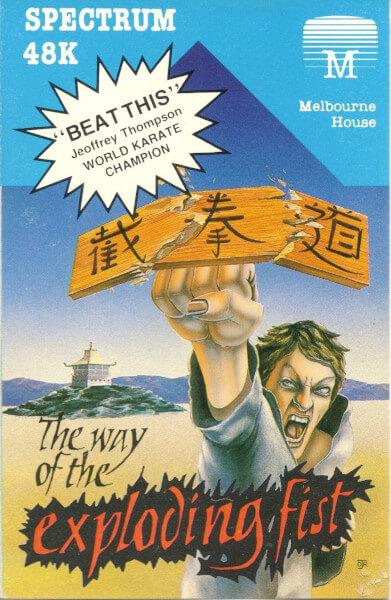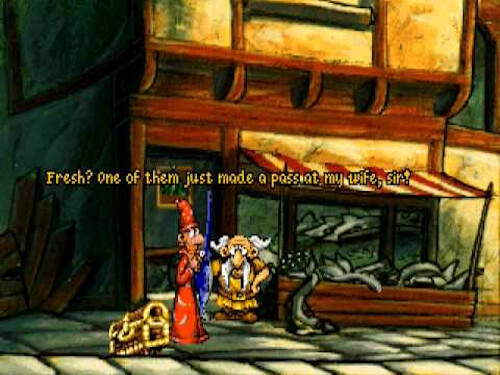Developer Interviews
This episode is part of a series of interviews with developers. Check out this page for more of them
Featured Image
The cover image for this episode uses a photo of Gregg from the Video Game Music Preservation Foundation wikiPlayers
If you wish to support the Waffling Taylors, and the other shows in the network, you can over at Ko-fi.com/jayandjaymedia. However, supporting us is completely voluntary and not required at all.
Another way to support us is to shout out about us on social media or give us a rating on your podcatcher service of choice. The more people who listen to the show, the more shows we can do.
Content Warning
One of the things we cover with Gregg is the swear-y easter eggs in the first two Discworld games. We’ve bleeped the swears, but it’s worth knowing that we cover that aspect of the games.
Please listen responsibly
Show Notes
Unfortunately Squidge was not around for the recording of this episode as he was unwell. And that’s a real shame because we interviewed Gregg Barnett, a real legend in video game development.
It’s a Fad, And It Won’t Last
Gregg has been around in video game development since the early 80’s and has seen generations of people saying:
Gregg
It’s a fad, and it won’t last
Which has been proven to be wrong year in and year out. In fact, we have huge, global, e-sports tournaments where folks play video games competitively these days.
… then again, you all know that
Gregg’s History
Gregg really does have a lot of experience in the gaming industry, and it goes back to him noodling around with an Atari-400. That noodling got him a job at Beam/Melbourne House. First came the ports and sequels, but then came the first original idea:

the breakout title for Gregg was The Way of the Exploding Fist
I really loved hearing the story of how Gregg knew that it was a hit. But before he told us that, he told us how folks used to code games by clearing out memory before actually writing the code. Which is something that you had to do, back in the day, because you couldn’t guarantee that the previous applications had cleared up after themselves when they closed.
Programming History
Gregg and I had a wonderful chat about programming through the decades. This is something that I have a keen interest in, because I love to look back at what the older tools and languages give you
I’m still working on something for the Mega Drive/Genesis, btw
And we ended up talking about Unity, Unreal, CryTek, and all of those other wonderful engines, and how they can take you so far away from what you’re building. They take you so far away from the hardware that when something goes wrong, it really goes wrong. He then tells us about a 5 hour long assembly run, and how it took almost all night to do the final assembly production run for The Hobbit on September 26th, 1983
which was when Australia won The American’s Cup for the first time
Creating New Genres
Back in the 1980s, creating new games usually lead to creating whole new genres. This meant that the real innovation was partially in getting new ideas down, and partially pushing the hardware to the very limit. Which is what you always get when you want to outdo the competition.
It was during this point that I talk about an article where someone had taken the Amstrad CPC 6128, reverse engineered the code, rewritten it, and made it better. Here is that article: https://fabiensanglard.net/cpc/
if you’re a dev, and want to see a genius at work, then read this article
Which I used as an example when asking Gregg about whether he would want to make something new with some older hardware. Which Gregg recommends people do, if they really want to learn about the hardware or want to see what they can do; but he wouldn’t do it himself, and that’s fair enough.
Discworld
We then started talking about the classic point-and-click adventure game: Discworld. We discuss how that came to be - including how Gregg won the contract - the ideas which went into the games, and what some of the ideas for more games would have been.

Dragon! Dragon! Dragon!
Gregg
Rincewind was always going to be the main character, as he was iconic.
When he first told me about how Gregg got the license to make the games - beating out the frankly massive competition - it blew me away. Seriously, how both Sierra Online and EA missed out on this is just phenomenal
then again, can you imagine what that would have been like?
it would have been the first point-and-click game powered by DLC and loot creates
I wont recreate the story here, you’ll have to listen to the episode to find out how it all came to be
jump to 52:31 for the story
Discworld Puzzles
Next up was a conversation about the puzzles and scenes in Discworld that Gregg loved the most. One of my favourites has always been:
- You need some mouse blood to perform the Rite of Ashk Ente
in order to summon Death
- You get a mouse
- You get a test tube
- You speak to a vampire who wears false teeth
- He lost his real teeth because he’d gone off blood
a proto-Black Ribboner?
- And had eaten too much jam
- He lost his real teeth because he’d gone off blood
- Convince the vampire that it was almost dawn
- Sneak into his crypt
- Use the teeth on the mouse
Which starts a scene where Rincewind puts the false teeth into his mouse and bites the mouse on the neck, drawing blood. The blood is then collected in the test tube and used to summon Death.
Gregg brings up the only key based puzzle in the first Discworld game, which was a direct parody of the overuse of key based puzzles in point-and-click games: it’s right where you need it, but it gets snatched away just as you grab it.
But one of his favourite puzzles
and the most notorious puzzle from that game
was the one involving this guy:

To this day, this puzzle is known as one of the hardest puzzles in point-and-click games, and there isn’t a single instance of Moon Logic involved.
The most interesting point that Gregg makes about this puzzle is that veteran point-and-click gamers seems to just not get this one, but folks who were entirely new to the genre just simply got it.
We also talked about the fourth-wall breaking pop-culture references, like the intro sequence for Discworld 2:
Pixel Hunting, Time Travelling and Swearing in Games
One of the things that I was always going to bring up with Gregg was the pixel hunting puzzle in the first game which leads to Rincewind swearing at the player
I wanted to know the genesis of this story, and Gregg delivered in the best way possible.
We also talked about the time-travel puzzle in the second game which takes you back to the first game and the two Rincewind’s have a chat about the pixel hunting puzzle from the first game
pretty meta, right?
which you can watch here:
Community Questions
We’d had a question from friend of the show James Studdart - he creates a show called The Cynical Developer
about Discworld Noir:
James
Discworld Noir was written by Chris Bateman, and went in a completely different direction to the previous games. What prompted this decision and what was it like to let go of the reins?
You’ll need to listen to the podcast in order to hear Gregg’s answer to this one.
One Last Game?
And you’ll need to listen to the episode to hear this discussion, too
talk about being a tease!
Advice For Aspiring Developers
The advice for aspiring developers was:
Gregg
If you’re in the UK, you don’t have to move country; you don’t have to move to London. But you’ve obviously gotta try and get into the industry anyway… but the key thing to do is to get some sort of portfolio. Whether you’re a programmer, or an artist, an audio person, or even a game tester… you definitely need the portfolio. You can’t just turn up at a job and say, "I’ve done a course at so-and-so university. I’m a programmer, or whatever"
You’ve gotta get something in your portfolio… and then you add stuff to your portfolio based on what they do.
There’s a lot more to it, so I’d recommend listening to the episode for his advice
this section starts at 1:28:44
External Links of Interest
- Support us on Ko-Fi
- Our Facebook page
- Us on Twitter
- “On the Coalface”
- 1983 America’s Cup
- A tale of Ghosts’n Goblins’n Crocodiles
- Rite of Ashk Ente
- Black Ribbon
- Moon Logic
- The Watch (TV Series)
- I’m not convinced that this will be even vaguely related to what Pratchett envisioned
- In fact, his daughter has said that she has nothing to do with it
- Gregg currently works at Experiential Productions
- And is actually involved in the creation of FLAIM
Music
Links to the music used in the podcast can be found below. Definitely check them out, because they're amazing tracks by awesome musicians.
- Intro music is Among The Stars, from the Cosmos Music Pack by Muz Station Productions
- Spoiler Break music is Spectrum (Subdiffusion Mix) by Foniqz (BandCamp)
- Pallet Cleanser music is Breath Deep Breath Clear (Wu Chi) by Siobhan Dakay
- Pac-Man theme © Bandai-Namco
- Goldeneye 007 theme © Rare/Danjaq LLC and the United Artists Corporation
- Various quips from the first Discworld title © Perfect Entertainment/Narrativia
- Super Mario Bros. Death Sound © Nintendo/Koji Kondo
- Various pieces of music from the Discworld trilogy © Perfect Entertainment/Narrativia
- Outro Music is I N e e d Y o u 私の側て by G.H (removed from BandCamp)
Games Covered
We mentioned 23 games in this podcast. In the following order, those games where:- Space Invaders
- Pac-Man
- Ghost Master
- Terry Pratchett's Discworld
- Goldeneye 007
- Hungry Horace
- Horace Goes Skiing
- Way of the Exploding Fist
- Rock'n Wrestle
- The Hobbit
- Horace and the Spiders
- Katate-ka
- Bedlam
- Ghosts'N Goblins
- Far Cry 5
- Discworld Noir
- King's Quest (series)
- Discworld II: Missing Presumed...
- Super Mario Bros.
- Super Mario Bros. 2
- Far Cry
- Fallout (series)
- Shadowrun